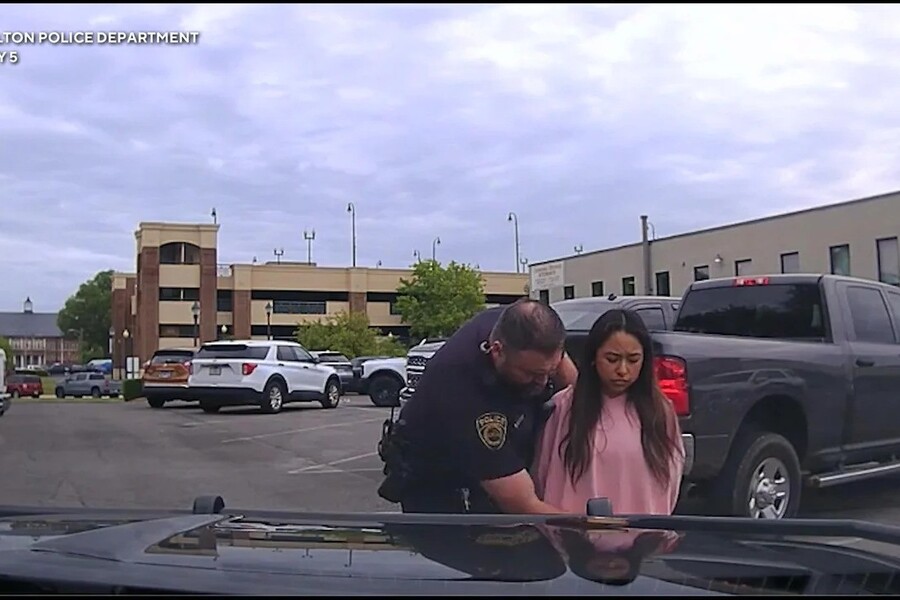Dalton, Georgia — Ximena Arias Cristobal, a 19-year-old Mexican-born woman who has lived in the United States since she was four years old, is facing deportation even though the traffic violations that led to her arrest by Immigration and Customs Enforcement (ICE) were dismissed.
In an emotional first interview since her detention, Arias Cristobal shared her deep fears about being forced to leave the only home she has ever known. Speaking by phone from an ICE detention facility in Georgia, she said, “My life is here, and I’m scared I’m going to have to start all over again in a country that I don’t know.”
Arias Cristobal has been held at the Stewart ICE detention center in Lumpkin, Georgia, since May 5, when a Dalton police officer arrested her following a traffic stop on charges of making an improper turn and driving without a license. Those charges were dismissed on May 12 after local officials determined the officer had stopped the wrong vehicle.
Despite the dismissal, ICE continues to detain her and is moving forward with deportation proceedings. Her father, who was arrested in a similar traffic-related incident last month, is also being held at the same facility.
A Life Rooted Deeply in Georgia
Arias Cristobal’s story reflects the complex and often heartbreaking realities facing many undocumented immigrants in the United States. Though she was brought to the country as a young child in 2010, she did not qualify for the Deferred Action for Childhood Arrivals (DACA) program because she arrived after the June 2007 cut-off date established during the Obama administration. This leaves her without legal protection despite having spent roughly 15 years living, studying, and growing up in Georgia.
She graduated from Dalton High School last year and is currently a college student. Her mother, Ndaihita Cristobal, described her daughter’s upbringing as a typical American childhood despite the family’s undocumented status.
“Ximena is a calm girl. She’s dedicated to studying, very active, and disciplined,” Ndaihita said in Spanish outside their Dalton home. “She set goals for herself and participated in cross-country running. She’s close to her younger sisters and is a caring sibling.”
Dalton, a city about 90 miles north of Atlanta, has a significant Latino population, many of whom are immigrants. Half of the city’s residents identify as Latino, underscoring the tight-knit community to which the Cristobal family belongs.
Family and Community Under Strain
The family’s situation has left deep emotional scars, especially for Ximena’s two younger sisters, ages 12 and 9, both U.S. citizens. Aurora, the 12-year-old, told CBS News she is struggling to focus at school amid constant worry about the fate of her family.
“My family’s a good family… they’re not criminals,” Aurora said. “They might have come here illegally, but they came here to fulfill their dreams.”
Since her father’s arrest, Ndaihita has become the main provider for the family, a role that adds to the pressure as the community watches anxiously. Aurora fears her mother could also be detained.
“She’s the last hope we have. She’s the grown adult here, working and paying the bills,” the young girl said tearfully.
Changing Immigration Enforcement Under Trump’s Second Term
Arias Cristobal’s arrest and ongoing detention highlight a significant shift in immigration enforcement priorities following President Trump’s second inauguration. Whereas earlier administrations, including the Biden administration, focused ICE’s resources primarily on arresting individuals who posed national security threats, serious criminals, or recent border crossers, the Trump administration has vastly expanded the categories of immigrants subject to arrest and deportation.
Under current policies, undocumented immigrants with no criminal record, like Arias Cristobal, are increasingly vulnerable to detention and deportation. Many advocates argue this shift undermines the humane aspects of immigration enforcement and catches individuals who are contributing members of their communities.
Before Trump’s re-election, Arias Cristobal likely would have avoided ICE detention despite her undocumented status and lack of a criminal record. Now, local police in jurisdictions like Whitfield County, Georgia, cooperate closely with ICE by turning over noncitizen detainees, fueling widespread concern about civil rights and due process.
Local and Political Reactions
The dismissal of the traffic charges against Arias Cristobal sparked outrage and sadness in the Dalton community and beyond. Georgia State Representative Kasey Carpenter, a Republican who represents Dalton, voiced his concern publicly.
“There’s been an uprising of heartbreak for our community because a lot of people felt we were targeting hard criminals, but unfortunately, good people are getting caught in the wash,” Carpenter said. He added that he wrote a letter vouching for Arias Cristobal’s character, calling her “an asset” to the community.
However, conservative voices have defended the arrest. U.S. Representative Marjorie Taylor Greene, a vocal immigration hardliner who represents the district, issued a statement backing ICE’s actions.
“While local Dalton officials dropped her charges, the facts remain: she was driving illegally without a license and has no legal basis to remain in the United States,” Greene said. She praised the Trump administration for “upholding our nation’s immigration laws.”
The Human Toll of Deportation Proceedings
Throughout her detention, Arias Cristobal has maintained daily phone contact with her family, offering reassurance and sharing her anguish over their forced separation. On Mother’s Day, CBS News was present when she called home, her voice breaking as she pleaded for compassion.
“The hardest part is being ripped away from each other,” she said.
In a country divided over immigration policy, stories like Ximena Arias Cristobal’s bring a human face to the often polarizing debate. Her case raises urgent questions about the consequences of expanded immigration enforcement, the impact on families and communities, and the balance between law and compassion.
As deportation proceedings continue, the young woman and her family remain hopeful that their plea will be heard, not just as a legal matter, but as a profoundly human story about belonging, identity, and the American Dream.
